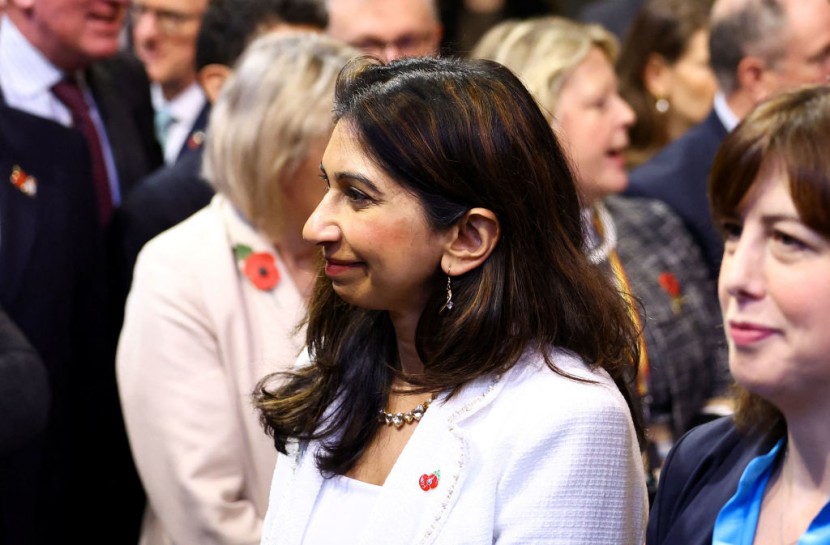The UK's largest police force received criticism from Interior Minister Suella Braverman on Thursday for being more compassionate toward pro-Palestinian protesters than other groups, which has caused a political conflict sparked by the Israel-Hamas war.
Suella Braverman's statement that London's Metropolitan Police were overlooking lawbreaking by 'pro-Palestinian mobs' in a highly unusual attack on police was characterized as 'hate marchers'.
Protests Supporting Palestine

Since the war began more than a month ago, protests supporting Palestine have taken place every weekend in London and other British cities. The government has expressed disapproval of organizers for planning a march on Saturday, which marks Armistice Day, and is when many in Britain pause to remember the victims of war.
The Cenotaph war memorial in central London will be wreathed by King Charles III, senior politicians, diplomats, military leaders, and veterans on a day before the main Remembrance Sunday commemorations will take place. Despite being only a few steps from Parliament, the monument is not within the planned route's vicinity.
The dispute seemed to end, but Braverman triggered a significant escalation with an article in the Times of London. She asserted that the police acted with more leniency towards pro-Palestinian demonstrators and Black Lives Matter supporters than towards right-wing protesters or soccer hooligans.
Braverman said "There is a perception that senior police officers play favorites when it comes to protesters," and called demonstrations calling for a cease-fire in Gaza "an assertion of primacy by certain groups," particularly Islamic extremists, "of the kind we are more used to seeing in Northern Ireland," an apparent reference to demonstrations by Irish republican groups.
Read Also : South Korea-Italy Join Forces To Foster Cooperation Aiming for Scientific, Technological Advancements
Dismissing Braverman
Prime Minister Rishi Sunak a prominent figure with the authoritarian wing of the governing Conservative Party, was facing increasing pressure to dismiss Braverman. Max Blain, Sunak's spokesperson, stated that Braverman's article was not approved by the Prime Minister's office prior to publication, but that Sunak still had complete trust in her.
Critics say Braverman is trying to position herself for a party leadership contest that could come if the Conservatives lose power in the election next year. Opinion polls, for months, have put the party 15 to 20 points behind the Labour Party.
Countries around the world have grappled with how to handle strong emotions stirred by the Middle East conflict.
France's interior minister last month issued an order to local authorities nationwide to ban pro-Palestinian protests, citing risks to public order. France's highest administrative authority overturned the blanket ban a week later and said decisions should be made locally, due to risks to public order.
Since then, France has seen several pro-Palestinian protests, some authorized and peaceful, some not, and quickly dispersed by police.
Sunak expressed his opposition to the planned protests on Remembrance Weekend as 'provocative and disrespectful.' However, after meeting with Police Chief Mark Rowley on Wednesday, Sunak declared that the government supports the right to peacefully protest.
The violence in Northern Ireland between Irish republicans, British loyalists, and UK security forces resulted in the deaths of over 3,600 people over 30 years. Braverman's comparison was labeled as insensitive and inaccurate by many politicians in attendance.
Colum Eastwood, the leader of the Irish nationalist Social Democratic and Labour Party, expressed his dissatisfaction with Braverman's lack of awareness about the civilian population in Gaza, the role of the Met police, and the complex history and traditions of marching and protesting in Northern Ireland.
Eastwood stated that Braverman has managed to offend just about everyone and Opposition politicians said Sunak's unwillingness to fire Braverman showed weakness on the prime minister's part.
The protests are organized by left-wing groups and Muslim organizations. There also have been large rallies supporting Israel and demanding Hamas free the hostages it seized in its Oct. 7 attack.
Police say there have been almost 200 arrests across London related to the conflict, including 98 for suspected antisemitic offenses and 21 for alleged anti-Muslim offenses.
Protests can be banned in Britain only if there is a risk of serious disorder. Police said that threshold has not been met, though they are worried that "breakaway groups intent on fueling disorder" may show up, including far-right activists.
The home secretary is responsible for law and order and immigration policy, including the government's stalled plan to send asylum-seekers who arrive in Britain in boats on a one-way trip to Rwanda.
Related Article : Rishi Sunak Allows Armistice Day Pro-Palestine March in London









